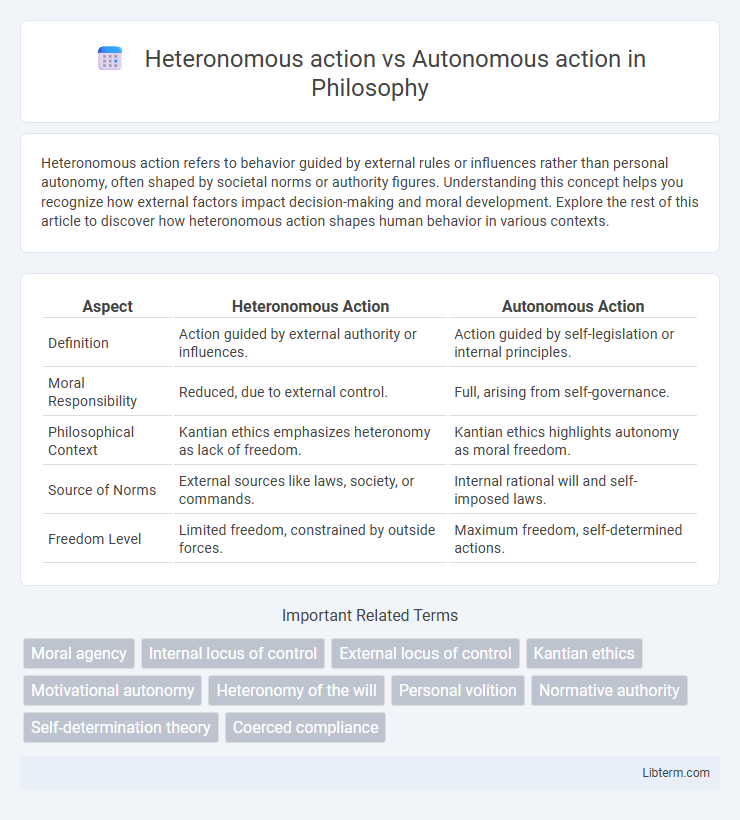Heteronomous action refers to behavior guided by external rules or influences rather than personal autonomy, often shaped by societal norms or authority figures. Understanding this concept helps you recognize how external factors impact decision-making and moral development. Explore the rest of this article to discover how heteronomous action shapes human behavior in various contexts.
Table of Comparison
| Aspect | Heteronomous Action | Autonomous Action |
|---|---|---|
| Definition | Action guided by external authority or influences. | Action guided by self-legislation or internal principles. |
| Moral Responsibility | Reduced, due to external control. | Full, arising from self-governance. |
| Philosophical Context | Kantian ethics emphasizes heteronomy as lack of freedom. | Kantian ethics highlights autonomy as moral freedom. |
| Source of Norms | External sources like laws, society, or commands. | Internal rational will and self-imposed laws. |
| Freedom Level | Limited freedom, constrained by outside forces. | Maximum freedom, self-determined actions. |
Introduction to Heteronomous and Autonomous Actions
Heteronomous action refers to behavior guided by external rules, authority, or social norms, where individuals comply with regulations imposed by others rather than self-determined principles. Autonomous action, in contrast, involves self-governed behavior driven by personal values, intentions, and internal motivations, emphasizing moral responsibility and independent decision-making. Understanding the distinction highlights the influence of external control versus internal agency in shaping human conduct within social and ethical contexts.
Defining Heteronomous Action
Heteronomous action refers to behavior that is directed or controlled by external forces, such as laws, rules, or social authorities, rather than by the individual's own will or judgment. It emphasizes obedience to external regulations and constraints imposed by others, limiting personal autonomy in decision-making processes. This concept contrasts with autonomous action, where individuals act based on self-governance and internal motivations free from external influence.
Understanding Autonomous Action
Autonomous action refers to behavior driven by self-governance, where individuals act according to their own values, goals, and reasoning without external control or coercion. This type of action emphasizes personal agency, decision-making capacity, and the alignment of actions with one's authentic self and intrinsic motivations. Understanding autonomous action is crucial for fields like psychology, ethics, and philosophy, as it underpins concepts of moral responsibility, self-determination, and individual freedom.
Key Differences Between Heteronomous and Autonomous Actions
Heteronomous action is guided by external rules or authority, where behavior is controlled by outside forces such as laws, social norms, or commands. Autonomous action, in contrast, originates from internal motivations and self-governance, reflecting individual free will and personal decision-making. The key differences lie in the source of control--heteronomous actions depend on external constraints, while autonomous actions are driven by internal principles and self-regulation.
Psychological Perspectives on Autonomy and Heteronomy
Heteronomous actions arise from external pressures, rules, or influences, reflecting a lack of self-governance in decision-making processes. Autonomous actions emerge when individuals exercise self-determination, guided by internal values and intrinsic motivation, aligning with psychological theories emphasizing personal agency and self-regulation. Cognitive and developmental psychology highlight autonomy as crucial for identity formation and mental well-being, whereas heteronomy is often linked to conformity, external control, and reduced psychological empowerment.
Philosophical Foundations: Kant’s View on Moral Actions
Kant's philosophy distinguishes heteronomous action, where behavior is influenced by external factors or desires, from autonomous action, guided by rational self-legislation and moral law. Autonomous actions arise from the categorical imperative, reflecting duty and universal moral principles rather than conditional or contingent motives. Kant argues true moral worth exists only in autonomous actions performed out of respect for the moral law, emphasizing self-governance as the foundation of ethical behavior.
Heteronomy and Social Influence
Heteronomous action is driven primarily by external social influences and authority, where individuals comply with rules and norms imposed by others rather than their own volition. This type of behavior reflects the dominance of heteronomy, where moral and decision-making frameworks stem from societal expectations rather than personal autonomy. Social influence, including peer pressure and cultural norms, plays a critical role in shaping heteronomous actions, emphasizing conformity over individual self-determination.
Autonomy and Personal Responsibility
Autonomous action emphasizes self-governance, where individuals make decisions based on personal values and rational deliberation, highlighting the core of personal responsibility. Heteronomous action involves behavior influenced or controlled by external forces, reducing the agent's capacity for autonomous choice and moral accountability. Autonomy is crucial for ethical agency, as it empowers individuals to accept responsibility for their actions and their consequences.
Real-World Examples and Implications
Heteronomous action occurs when individuals follow external rules or authorities, such as employees adhering to company policies or students complying with school regulations, limiting personal freedom but ensuring social order. Autonomous action involves self-governed decisions based on personal principles and values, exemplified by entrepreneurs creating innovative solutions or citizens voting based on informed beliefs, promoting individuality and ethical responsibility. The implications of these actions affect organizational efficiency, personal accountability, and societal development, balancing control with freedom in various contexts.
Conclusion: The Importance of Fostering Autonomy
Fostering autonomy enhances personal growth and ethical decision-making by encouraging individuals to act based on internal values rather than external pressures inherent in heteronomous actions. Autonomous actions support intrinsic motivation, leading to greater responsibility and self-regulation, which are crucial for long-term success and well-being. Prioritizing autonomy in education and leadership promotes creativity and empowerment, ultimately contributing to more resilient and adaptive communities.
Heteronomous action Infographic

 libterm.com
libterm.com